
The Big Three automakers, namely Ford, General Motors, and Stellantis, have reportedly laid off approximately 5,000 workers since the commencement of the significant United Auto Workers (UAW) strike.
However, these layoffs could have potentially been more substantial if it weren't for the strategic stand-up strike approach adopted by the union, as per Investopedia via MSN.
UAW Strikes Escalate as Ford's Kentucky Plant Joins Walkout
Amid a protracted strike by the United Auto Workers (UAW) against major automakers, tensions escalated as the UAW expanded its strikes to include Ford's highly profitable Kentucky Truck Plant. This sudden move has intensified the challenging negotiations between the UAW and the Big Three automakers - Ford, General Motors (GM), and Stellantis.
"We have been crystal clear, and we have waited long enough, but Ford has not gotten the message," declared UAW President Shawn Fain.
"It's time for a fair contract at Ford and the rest of the Big Three. If they can't understand that after four weeks, the 8,700 workers shutting down this extremely profitable plant will help them understand it."
Ford officials confirmed that the UAW had requested a negotiation session, but discussions ended abruptly. The union has expressed their desire for an alternative proposal, differing from the one previously put forth by Ford.
In a statement, Fain expressed his disappointment, conveying a clear message to the company, stating, "If that's the extent of your offering, it appears that KTP (Kentucky Truck Plant) is no longer in your hands."
The UAW had been on strike against Ford, GM, and Stellantis since September 15. This expansion to the Kentucky Truck Plant, which generates about $25 billion in annual revenue for Ford, marked a significant development in the ongoing strike.
While it doesn't produce the best-selling F-150, the plant manufactures larger versions of the truck, the Ford Expedition, and Lincoln Navigator SUVs. Until this point, the UAW's strike at Ford had targeted the Wayne, Michigan plant, producing the Ford Ranger and Bronco, and the Chicago Assembly plant, which manufactures Ford Expedition and Lincoln Aviator SUVs.
However, these vehicles are more critical to Ford's profitability than heavy-duty and full-size pickups. The company believed its economic terms offer was the best among the Big Three, focusing on wages and benefits, according to Fox2 Detroit.
UAW Strike Creates Concerns, Layoffs in Auto Industry
A statement from Ford expressed concerns over the strike's impact on its workforce, suppliers, dealers, and commercial customers, stating that shutting down the Kentucky Truck Plant would also jeopardize other operations.
The UAW's move was a surprise, as earlier discussions indicated that progress was being made toward ending the strike. For example, GM had recently agreed to the union's demand to include workers at a joint venture battery plant, a key bargaining demand for the UAW.
The UAW is particularly concerned about the automakers' shift toward electric vehicles, fearing it could lead to job losses at union-represented engine and transmission plants. Negotiations have focused on battery plants and retirement benefits in recent weeks.
The strike's impact extended beyond Ford, as related layoffs occurred at Livonia Transmission Plant and other facilities. Stellantis also announced layoffs at the Trenton Engine Complex in Michigan and the Kokomo Casting plant in Indiana, affecting 640 represented employees due to the UAW strike action.
GM laid off an additional 200 workers due to the ongoing strike. The UAW strike has now affected 43 facilities nationwide. With UAW President Shawn Fain continuing to add plants to the strike as negotiations progress, it remains uncertain when the strike will conclude.
GM recently outlined an offer that includes substantial wage increases and other concessions to address the union's concerns, but negotiations have yet to result in a resolution, CNN News Reported








